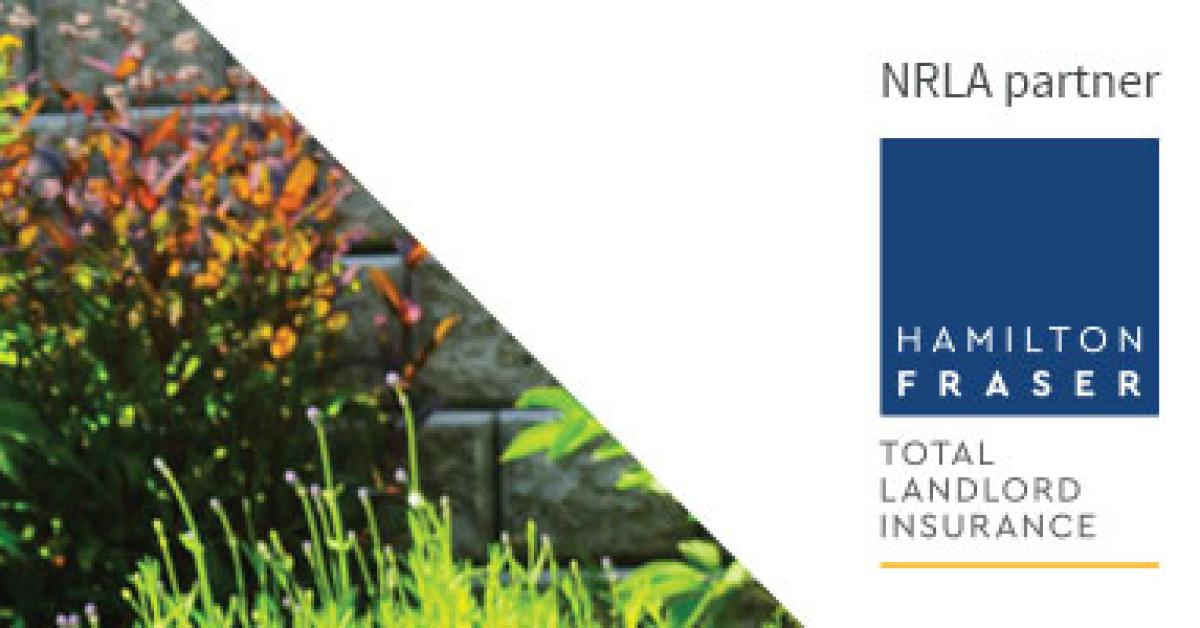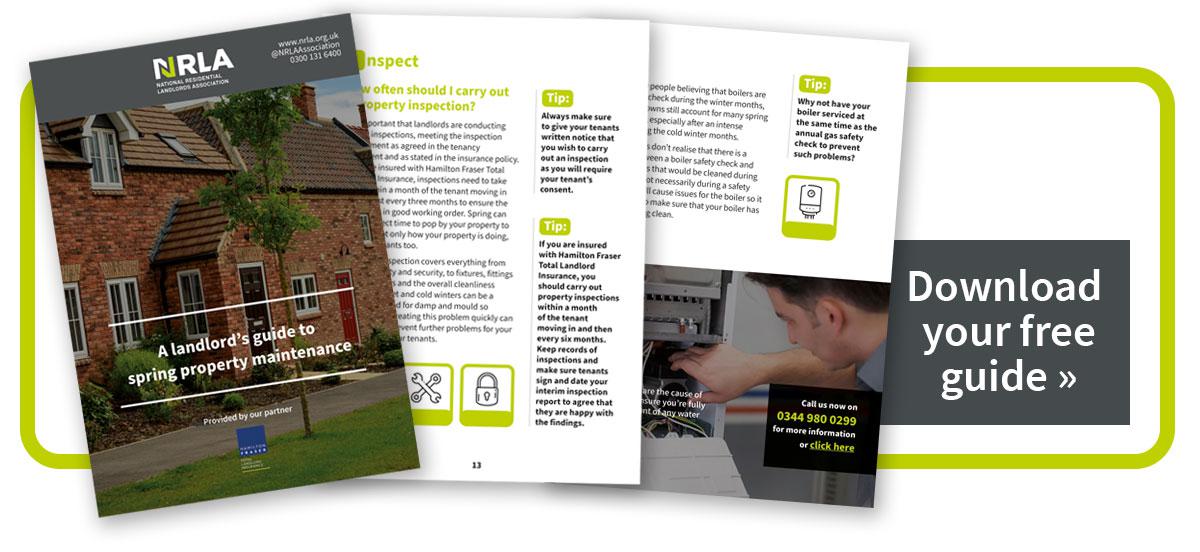

A welcomed spring clean - carrying out property maintenance during Covid-19
NRLA partner, Hamilton Fraser Total Landlord Insurance share their useful guidance for landlords on how to carry out spring property maintenance despite the continued COVID-19 restrictions.
On 28 March, the clocks will finally spring forward and we can all finally look ahead to longer, lighter evenings after what has been a difficult and prolonged winter period. Spring has long represented a great opportunity for landlords to carry out essential property maintenance after the harsh winter weather has finally subsided. A year of COVID-19 restrictions, as well as local and national lockdowns, has meant that many rental properties are in need of some TLC.
With not only lighter evenings on the horizon, hopes for eased coronavirus restrictions are within view as the vaccine roll out gathers speed.
This will be reassuring for landlords and their tenants who have faced a significant period of uncertainty, especially surrounding rental payments, tenant wellbeing, property maintenance and the impact of the pandemic on their own finances.
As always, landlords are still legally obligated to keep their rental property in a good state of repair.
However, this must be correctly assessed and balanced against the potential risk of infection or spread of COVID-19 and should not put you or your tenants at risk. Government guidance (as of February 2021) states that:
“Landlords can take steps to carry out repairs and safety inspections, including routine and essential inspections and repairs, as well as any planned internal works to the property under the national lockdown which is in force in England, provided these are undertaken in line with public health advice and the relevant coronavirus (COVID-19) legislation.” In addition, “Landlords should be aware that some tenants may still want to exercise caution and respect this when engaging with their tenants”. Read the latest government guidance here.
Limiting face to face contact with your tenants is of course the best way to ensure the safety of both you and your tenants, but there will be occasions where you may need to visit the property such as to conduct repairs or for a safety inspection. If you need to carry out repairs or an inspection you should contact your tenants in advance to schedule a suitable time and to discuss appropriate social distancing measures that will be required from you.
If anyone in the property is experiencing COVID-19 symptoms or self-isolating then any planned inspections or repairs should be rescheduled until it is safe to do so, unless this is to “remedy a direct risk that affects their safety or the safety of their household”. Landlords, agents and tenants must ensure that they are following the Government COVID-19 guidance at all times.
Landlords should take a common sense approach to whether the work required is essential or can be undertaken remotely, or with your tenants assistance (for example, in the case of a property inspection). Read more about the rules surrounding property maintenance in the NRLA guide here.
While spring property maintenance may not currently be at the top of your priority list, conducting an improvised inspection with the help of your tenants, can help to ensure that you fulfil your obligations as a landlord while also potentially mitigating any issues later on in the year.

Put a SPRING in your property maintenance step
You may not be able to follow our Hamilton Fraser Total Landlord Insurance spring property maintenance guide to the letter under the current circumstances, however it still contains useful hints and tips to keep you and your tenants on track.
Adaptations to our S P R I N G maintenance acronym can help.
Structure
As a landlord, carrying out an inspection of the property structure is made more difficult if you are not able to access the property. In the event of any worrying structural issues that put your tenants at risk this is a very different story, however, for most landlords this simply means assessing any damage caused to the building over the harsh winter weather, including roof damage, wood rot or subsidence.
If you are unable to carry out an inspection in person, and have a good rapport with your tenants, why not seek their help in assessing these key areas? Tenants who understand your motivations for doing this may be happy to help out with a quick checklist of visual inspections that they can report back to you. Don’t forget in this instance to keep detailed records of this and don’t ask your tenants to carry out any potentially unsafe maintenance on your behalf, especially if it requires professional advice or support. It is still your responsibility to ensure the safety and security of your tenants at all times.
If you don’t have a glowing relationship with your tenants now is as good a chance as any to check in and see how they are doing during the current lockdown - it could help to build their trust in you as a good landlord. This will help you to build your relationship, benefiting both your tenant and the property. In the event that this is simply not possible, ensure that you keep a record for future reference and make it clear that you have made every attempt to address any issues that have been raised.
Pipes
Checking pipes after a long cold winter is vital to ensure that they are in good working order and not experiencing a reduced flow, blockage or have burst. Ask your tenants to notify you if they experience a reduced flow in water, which could signify an issue with the pipework. This is especially important after the recent cold weather spells that we have had.
It is also worthwhile informing your tenants of the location of the stopcock so that they can locate it in the event of an emergency, to limit any damage caused by a burst pipe. This is a simple, yet extremely effective, tip should the worst happen.
Removal
Now is a great time to remind tenants about the importance of keeping the property clean and tidy, as well as notifying you of any potential problems with white goods and appliances.
Any leaves, twigs or rubbish accumulating around the property not only makes it unpleasant to look at, but also cause safety concerns, for example dried leaves and twigs could present a fire hazard and discarded waste attracts pests.

Inspection
Unlike last spring, landlords are permitted to enter the property for inspection and repair purposes. Therefore, landlords may be able to carry out an in-person inspection, providing they, and the tenants, are following the Government’s public health guidance. If you are unable to visit the property in person then improvisation is a landlord’s best tool. Carrying out a virtual property inspection with the assistance of your tenant could be one way around this issue. This would give your tenants the perfect opportunity to discuss any property concerns they have with you, document your inspection and provide you with the opportunity to see the property, albeit not in person.
It is also worth noting that with more people in their homes over this period, condensation, damp and mould is a particular area that you should play close attention to.
Next time
Even as we tentatively move towards an easing of lockdown, the current confinement provides landlords and their tenants with time to think about the months to come and identify any potential problems that could impact the property long term.
Remember, carrying out this pre-emptive maintenance can keep you one step ahead of problems, leaving your property and tenants healthy and happy. Ask your tenants to keep a working list of any concerns or questions that you can address to avoid them being forgotten about at a later date. This will hopefully help to prevent any property issues escalating, resulting in extensive property repairs.
Garden
Landlords should not ask tenants to perform any potentially unsafe maintenance on the property, such as cutting down trees and shrubbery or checking the roof and guttering, as this puts them at significant risk. However, encouraging your tenants to get some fresh air in the garden or any outside space you have (while remaining compliant with social distancing measures), is not only great for their mental health but could even be beneficial from a property perspective.
Why not initiate a constructive dialogue with your tenants about the garden? There may be small aspects of property maintenance that they can carry out on your behalf if you are unable to access the property, such as light weeding, tidying and general maintenance. Some of this may already be your tenant’s responsibility so it is always a good memory refresh to double check your tenancy agreement.
Top tip: don’t forget to keep all spring property maintenance properly documented and date and time stamped.
For more hints and tips read our full landlord guide to spring property maintenance.

The importance of good landlord and tenant communication
The vast majority of revised spring tips involve good quality communication with your tenants. While we begin to see a slow return to in-person property maintenance there is still a way to go. With this in mind, continued quality communication between landlords and their tenants is still more important than ever. Getting this right can significantly reduce problems and property stress for you both.
If you haven’t already, make sure that you speak to your tenants about how they are doing during this continued unsettling time. It is likely that you are currently facing similar worries over rental payments, housing and financial factors. A problem shared is a problem halved.
Maintenance responsibilities
The distinction between landlord and tenant responsibilities during the current climate has in some instances become blurred. This doesn’t mean however that landlords should not take their legal responsibilities seriously, and as stated by the Government, landlords’ repair obligations have not changed.
However, it is not unrealistic to assume that, as a result of the current climate, some property maintenance and inspections may involve greater landlord and tenant collaboration, especially if you are not able to visit the property in person. This is an extremely positive factor in building a lasting and successful landlord and tenant relationship, whereby open communication can help resolve issues and potentially prevent them from occurring in the first place.
Just as landlords’ obligations and responsibilities remain the same, tenants’ do too. In a number of areas, such as garden maintenance, this should be clearly outlined in the tenancy agreement. However, during these ever-changing times no two days ever seem the same. Operating with empathy, understanding and patience is the key to navigating this together.
The importance of future planning
The current pandemic won’t last forever and despite ongoing daily changes as a result of COVID-19, you are still responsible for the safety and security of your property and tenants. Whilst current maintenance will be impacted in the short term we are hopefully beginning to see a gradual return to some sense of normality, and so putting best practice methods into place now can serve you well once the pandemic is over.
Continuing to carry out as much of your spring property maintenance regime as you can will stand you in good form for the summer, autumn and winter months. Don’t forget to also protect your property for a number of eventualities with comprehensive landlord insurance from NRLA Property Insurance partner, Hamilton Fraser Total Landlord Insurance.


